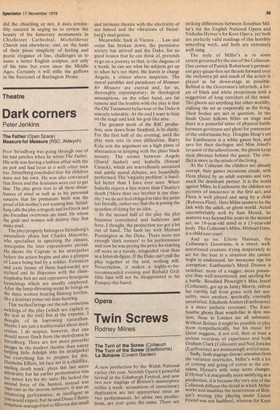Theatre
Dark corners
Peter Jenkins
The Father (Open Space) Measure for Measure (FISC, Aldwych) Poor Strindbcrg was going through one of his bad patches when he wrote The Father. His wife was having a lesbian affair with the au pair and had been at it with other men too. Strindberg concluded that his children were not his own. He was also convinced that Ibsen and the feminists were out to get him. The play gives vent to all these disturbances of mind as well as to his perennial concern that his premature birth was the proof of his mother's not wanting him. Strindberg calls the play a tragedy and its Greek and pre-Freudian overtones are loud. He whom the gods and women will destroy they first make mad.
The play properly belongs to Strindberg's naturalistic phase but Charles MaroWitz, who specialises in upsetting the classics, anticipates the later expressionist period. He shows the Captain in his straitjacket before the action begins and also a glimpse ot Laura being had by a soldier. Entrances and exits (some of them backwards) are Stylised and he dispenses with the claustrophobic box set and oppressive bourgeois furnishings which are usually employed. After the lamp-throwing scene he brings on the three women bearing flaming torches, like a feminist posse out man-hunting. This method brings out the sub-conscious swirlings of the play (which are explicit in the text at the end) but at the expense, I thought, of its harrowing naturalism. Maybe I am just a traditionalist about modernism. I do suspect, however, that one should never flinch from the melodrama in Strindberg. There are few more powerful helping in the modern theatre than nanny nelping little Adolph into his straitjacket but everything has to prepare for t.his. Den holm Elliott, his face set in a childlike, smiling death mask, plays this last scene admirably but his earlier performance was too minor key for my taste. He lacked the animal force of the hunted, instead was typecast as the morose introvert. It was an interesting performance, as intelligent as You would expect, but he and Diane Client() s°tilehow managed not to fill even this small and intimate theatre with the electricity of sex hatred and the vibrations of Strindberg's mad genius.
Meanwhile, back in Vienna. . Law and order has broken down, the permissive society has arrived and the Duke, for no good reason that he can think of, pretends to go on a journey so that, in the disguise of a monk, he can see what his subjects get up to when he's not there. He leaves in charge Angelo, a citizen above suspicion. The moral parables and paradoxes of Measure for Measure are eternal and, for us, thoroughly contemporary; its theological assumptions, on the other hand, are far remote and the trouble with the play is that the Old Testament behaviour of the Duke is scarcely tolerable. At the end I want to leap on the stage and kick his god-like arse.
The greatest merit of the RSC production, now down from Stratford, is its clarity. For the first half of the evening, until the play runs into its own difficulties, Barry Kyle sets the argument on a high plane of abstraction in keeping with the plain black scenery. The scenes between Angelo (David Suchet) and Isabella (Sinead Cusack), which are marvellously sustained and subtle moral debates, are beautifully performed. The 'virginity problem' is handled better than I have ever seen. When Isabella rejects a fate worse than Claudio's death (`More than our brother is our chastity') we do not feel obliged to take the point too literally, rather see that she is posing the question of dying for an idea.
In the second half of the play the plot becomes convoluted and ludicrous and here, I thought, the production too got a bit out of hand. The fault lay with Michael Pennington as the Duke. There were not enough 'dark corners' to his performance and now he was paying the price for starting off more as a trendy, misguided vicar than as a Jehovah-figure. If the Duke can't pull the play together at the end, nothing will. Nevertheless, it makes a highly-to-berecommended evening and Richard Griffiths fans will not be disappointed in his Pompey-the-bawd.






































 Previous page
Previous page